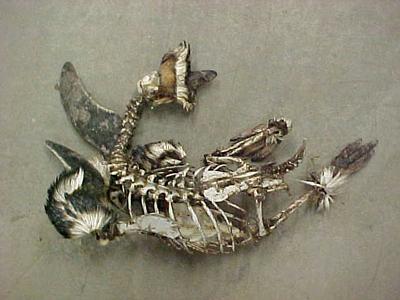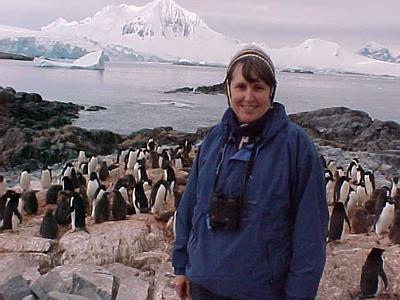11 January, 2000
Hello again!
The weather today was absolutely wonderful. People are genuinely
surprised by the consistent clear sunny weather. No one is
complaining that is for sure. It is really hard for me to stay
indoors. I want to go out and explore all the time. You would
really have to discipline yourself to ignore the call of the wild and
stay inside and work. The temperature is about 45 degrees F. Little
or no wind. Great day in Antarctica! Well, as I mentioned
yesterday I have boating stories to share. I went to my Boating II
class this morning. My boating partner was Polly Penhale from NSF.
She is down here making a site visit at Palmer. Part of her job is to
approve funding for projects that go on down here in the Antarctic.
Ross Hein is our instructor. He is a very competent zodiac navigator
and incredibly knowledgeable about the Antarctic environment. He
reminds us about the boats safety pack and the map of the islands.
There is a checklist you go down to make sure you have all the
necessary items before venturing out. We learn how to check the
pontoons for proper air distribution, check the fuel line, prime the
motor, shift the gears, start the engine and steer the boat. We radio
in to let comm know where our destination is. I am first. I get up to
position myself to start and steer the zodiac. After 3 tugs on the
cord I finally get the engine started. I really should sit down when
I pull on the cord as I lost my balance and landed on Polly! I
shifted the boat into forward gear and turned the throttle. Away we
go! Sounds easy enough. Ross makes it look so easy. Turning the
boat was foreign to me. It took me a while to get the feel for it.
It seemed that whenever I was trying to get away from something, like
say, an ICEBERG, the boat would want to navigate towards it! You
have to give icebergs a wide berth for several reasons. They are
very unstable this time of year. They are melting and calving and
you never know when a huge chunk of ice is going to break off. You
don't want to be near it when it does, that is for sure. Speaking of
being near falling ice...We were in the zodiac a couple of days ago
observing a crabeater seal lounging on a slab of ice, when all of a
sudden the side of a bergie (small ice berg) fell off and hit the end
of the boat, splashed us good, and gave us all a start! That ice
would have hurt! Only about 1/10th or so of the iceberg is sticking
above the water. The rest of it is underwater. When a piece of the
ice calves off, it may change the buoyancy of the iceberg and it may
flip or "turtle." This happens all the time and you have to pay
attention. Ross was infinitely patient and kind and I finally got a
grip. Actually, by the end of class I was skipping along nicely. I
landed the boat on Stepping Stones Island. This is a special place
because it has nesting giant petrels on it. They have a wing span of
about 4 to 6 feet. You can walk amongst the birds and observe them
with their chicks. The birds have been habituated by some of the
scientists who study them. The adults allow one scientists to reach
up under them and weigh the chicks and examine them. I found this
unbelievable. Now, mind you these are wild birds! I am hoping to
get to go back with her for a closer look. If the birds are annoyed
or feel threatened they have the ability to induce projectile vomit!
It is called gak! They are incredibly accurate. They say the stench
is sickening and you will never be able to wash it out of your
clothes. They use this ability to vomit on demand to protect
themselves. This vomit is oily and when it hits another bird's
feathers, the bird will die. The oil saturates the feathers and when
the bird gets wet it is not able to stay warm. The giant petrels were
fascinating. Each nest has a male and female and both care for the
chicks. This island is not accessible to the public without permit or
permission, so I felt very honored to be there. Ross said that this
island has the nickname "Palmer Golf Course:" because from afar it
appears very green. Actually, there are only two flowering plants
that are found there in Antarctica. These plants give the island a
fairly lush appearance. These two plants are hair grass and cushion
plant. Hair grass is best described as little short tufts of grass.
The cushion plant resembles a tiny pin cushion and it grows very
slowly; about 1mm/year. I understood why they call this Stepping
Stone Island; you are suppose to step on the stones and not on the
plants. Ross Hein was kind enough to run by Torgersen Island to
collect a penguin skeleton I spotted at couple of days ago. I was
told by Dr.Fraser that penguin skeletons are rare, so I am very
excited about having one to include in the "ice chest." We are
keeping a lookout for other kinds of salvage items as well.....seals,
etc....
Side note:
I wanted to tell you a bit about the photographer presentation last
night. I was so impressed with the work these professionals have
produced. My little point and shoot does not take pictures like
theirs! Gary Braasch is in Antarctica under a media travel grant
from the Office of Polar Programs, National Science Foundation.
International Wildlife Magazine is also supporting his photography as
well as Blue Earth Alliance. He presented many moving pictures from
the Arctic, Alaska, and one fantastic photo of the research vessel,
Nathaniel B. Palmer, lite up in the Antarctic night, featured
recently in Discover Magazine.
Jim LoScalzo was the other photographer presenting his work. He is a
photographer with U.S. News and World Report and his work has taken
him all over the world. He had some gripping shots from Port Au'
Prince, Haiti, photos from the funeral of Princess Diana, President
and Hillary Clinton, Burma, Afganistan, Cuba....on and on. I was
impressed with their art and felt priviledged to have a personal
showing.
I will sign off for now.
More later...
Mimi

I found this Adelie penguin skeleton at Torgersen Island. Finding one is rare. Once cleaned, this one will become part of the "ice chest" which will be available to interested schools.

Polly Penhale, NSF Program Manager and boating partner! She is on Cormorant Island next to penguin rookery.
Contact the TEA in the field at
.
If you cannot connect through your browser, copy the
TEA's e-mail address in the "To:" line of
your favorite e-mail package.
|
